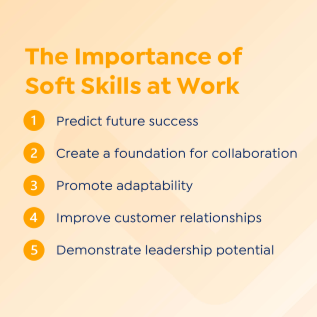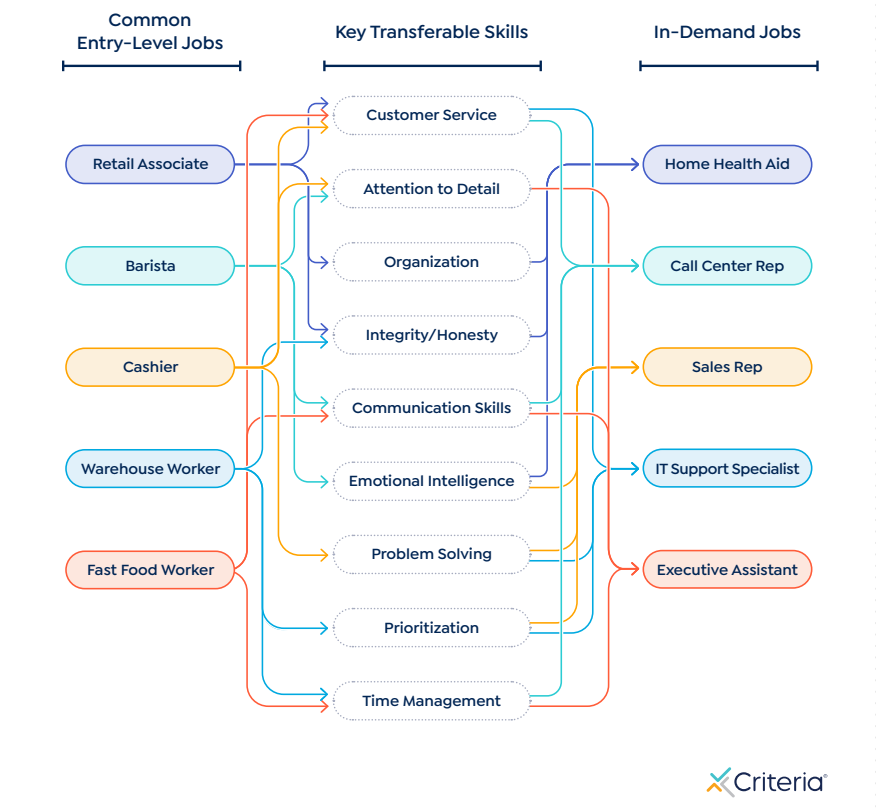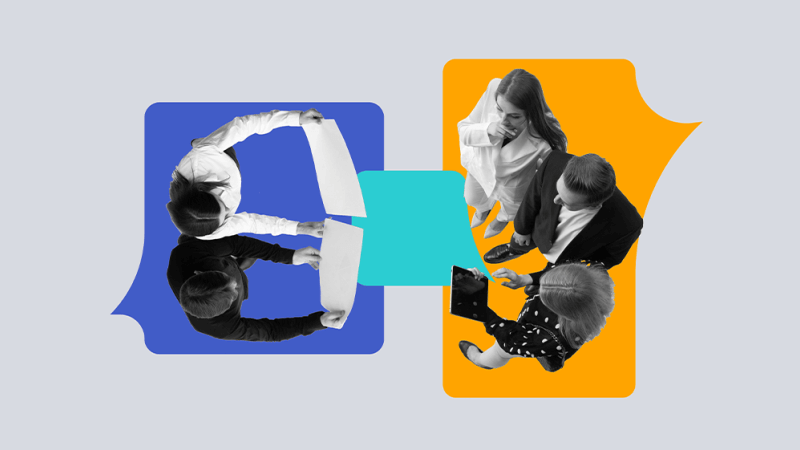In today’s rapidly evolving workplace, technical expertise alone can’t guarantee success. Increasingly, organizations are recognizing that soft skills – those interpersonal and cognitive abilities that help people work well with others and adapt to change – are what truly set top performers apart.
But how do you reliably identify these traits during the hiring process? Resumes and interviews don’t reliably demonstrate their depth. This is why more employers are turning to soft skills testing: a data-driven, objective approach that’s transforming how companies hire and build high-performing teams.
Let’s explore what soft skills tests are, how they work, the major soft skills you should look for, why these abilities matter so much in the workplace, and the most effective ways to measure them.
What is a Soft Skills Test?
A soft skills test is a type of pre-employment assessment designed to objectively measure a candidate’s interpersonal abilities, work habits, and cognitive traits. These are qualities that aren’t easily captured by resumes or interviews alone. Unlike hard skills tests (which evaluate technical know-how or specific competencies), soft skills tests focus on attributes like communication, problem-solving, adaptability, and teamwork.
Because soft skills cover a wide range of abilities, there are different assessments designed to evaluate different types of soft skills. These include:
- Cognitive aptitude tests: Assess attention to detail, critical thinking, and problem-solving abilities.
- Personality assessments: Evaluate behavioral traits such as patience, honesty, cooperativeness, and openness.
- Emotional intelligence tests: Measure the ability to understand and manage emotions, crucial for leadership and teamwork.
- Situational judgment tests (SJTs): Present real-world scenarios to gauge how candidates respond to workplace challenges.
By incorporating these assessments early in the hiring process, you’ll gain predictive, scientific data points that go beyond gut feeling to ensure candidates truly possess the soft skills needed for success.
How Criteria Helps
Criteria’s Talent Success Platform offers a comprehensive suite of soft skills assessments – including cognitive aptitude, personality, and emotional intelligence tests – that deliver actionable insights in real time. These tools are designed with candidate experience in mind and their results are easy for hiring teams to interpret, making it simple to compare applicants and identify those most likely to thrive in your organization.
What Are the 7 Major Soft Skills?
While the right combination of soft skills can vary by role or business sector, research highlights seven core soft skills that are widely applicable and lead to success:
- Communication: The ability to clearly express ideas, actively listen, and adapt messaging to different audiences.
- Emotional Intelligence: Recognizing and managing one’s own emotions and those of others, demonstrating empathy and self-awareness.
- Adaptability: Staying flexible and positive in the face of change or unexpected challenges.
- Problem-Solving: Approaching obstacles logically and creatively to find effective solutions.
- Leadership: Inspiring and guiding others, taking initiative, and empowering teams.
- Teamwork: Collaborating effectively, respecting diverse perspectives, and contributing to group goals.
- Time Management: Organizing tasks, prioritizing responsibilities, and meeting deadlines efficiently.
These skills are transferable across roles and industries, making them essential for both individual and organizational growth. The most effective hiring strategies will focus on evaluating the skills that the specific demands of the role require.

Why Are Soft Skills Important in the Workplace?
Soft skills are the grease between the gears of any effective team and power the engine that drives productivity, innovation, and long-term success.
Soft skills are:
- Predictive of Success: Soft skills are highly predictive of job performance and productivity, often more so than technical skills or experience alone.
- Essential for Collaboration: In today’s collaborative, cross-functional work environments, the ability to communicate, empathize, and work well with others is non-negotiable.
- Resilient Against Change: As automation and AI take over routine tasks, uniquely human skills like creativity, adaptability, and emotional intelligence become even more valuable.
- Vital for Customer and Client Relations: Soft skills directly impact customer satisfaction, client retention, and your company’s reputation.
- Necessary for Leadership and Growth: Employees with strong soft skills are more likely to become effective leaders, drive innovation, and help organizations navigate change successfully.
How do soft skills fit into the modern hiring landscape? A recent report from SHRM found that the majority of employers struggle to find candidates with the soft skills needed for workplace success, particularly among new graduates. This soft skills gap makes it even more critical for organizations to assess these abilities objectively during hiring. By prioritizing the evaluation of soft skills during the hiring process, you're able to make sure new hires are able to "bridge the gap" and bring the necessary capabilities your organization needs to succeed.
How Criteria Helps
Criteria’s scientifically validated assessments help organizations identify candidates with the soft skills to drive productivity, innovation, and team cohesion, ensuring you build a workforce ready to meet today’s challenges.
How Do You Measure a Soft Skill?
Measuring soft skills can be challenging, but advances in assessment science have made it possible to evaluate these traits with greater objectivity and reliability.
1. Pre-Employment Assessments
- Cognitive Aptitude Tests: Measure problem-solving, critical thinking, and learning agility. These are among the most predictive indicators of future job performance.
- Personality Assessments: Evaluate behavioral traits aligned with job success, such as cooperativeness, resilience, and openness to feedback.
- Emotional Intelligence Tests: Assess the ability to recognize, understand, and manage emotions—key for leadership and teamwork.
- Situational Judgment Tests (SJTs): Present candidates with realistic work scenarios to evaluate decision-making, communication, and conflict resolution skills.
2. Structured Interviews
- Ask targeted behavioral questions that require candidates to provide specific examples of how they’ve demonstrated soft skills in past roles.
- Use consistent scoring rubrics to reduce bias and ensure fair evaluation.
3. Role-Play and Simulation Exercises
- Observe candidates in real-time as they navigate workplace scenarios, allowing direct assessment of communication, problem-solving, and teamwork abilities.
The best practice is to combine multiple assessment methods (like pairing cognitive aptitude and personality tests with structured interviews). This approach yields the most reliable, comprehensive view of a candidate’s soft skills.
How Criteria Helps
Criteria’s platform enables you to seamlessly integrate a variety of assessments, from cognitive aptitude and personality to emotional intelligence and skills tests. Results are delivered in real time, with intuitive score reports that make it easy to compare candidates and identify those with the strongest soft skills for your team.
What Makes Criteria a Leader in Soft Skills Testing
Criteria’s Talent Success Platform is purpose-built to help organizations make evidence-based hiring decisions that go beyond the resume.
- Comprehensive Assessments: Measure cognitive aptitude, personality, emotional intelligence, and job-specific skills in one unified platform.
- Science-Backed Validity: All assessments are rigorously validated to ensure accuracy, fairness, and compliance with industry standards.
- Actionable Insights: Intuitive score reports and analytics tools provide clear, actionable data to inform your hiring decisions – no advanced training required.
- Candidate-Friendly Experience: Engaging, fast, and accessible assessments ensure a positive experience for applicants, helping you attract top talent.
- Real-World Impact: Customers have seen dramatic improvements in turnover reduction, hiring speed, and sales performance by incorporating Criteria’s soft skills testing into their hiring process.
Ready to see how Criteria can help you build a stronger, more adaptable workforce?
Soft Skills are a Workplace Essential
Soft skills aren't just "nice to have" - they form a critical foundation for success in today’s workplace. With the right approach to soft skills testing, you can move beyond guesswork and build teams that are capable but also collaborative, adaptable, and ready to lead. Criteria’s science-driven assessments make it easy to measure what matters most, helping you make confident, data-backed hiring decisions that drive real business outcomes. In a world where the only constant is change, investing in soft skills testing is your key to building a workforce that can thrive – no matter what the future brings.
Interested in elevating your hiring process?
Discover how Criteria’s Talent Success Platform can help you identify, assess, and develop the soft skills that power high-performing teams. Start your journey toward smarter, more successful hiring today by getting in touch or booking a demo.





